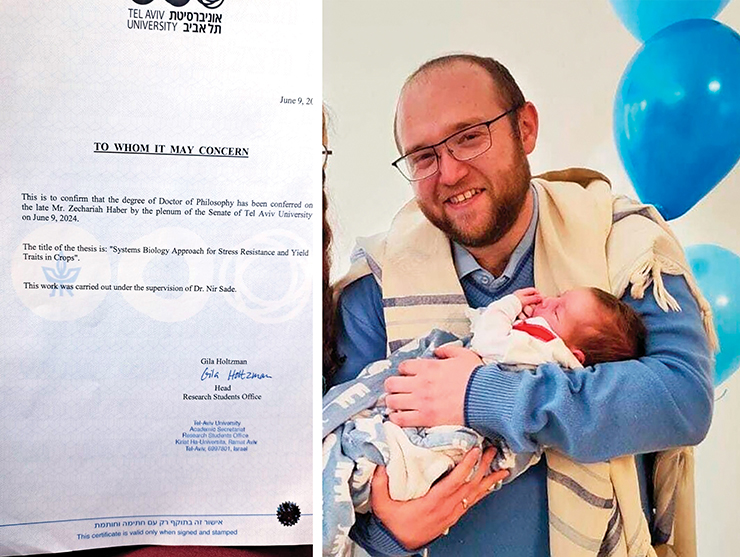
On January 16, 2024, Zechariah Haber HY”D, 32, was tragically taken from his family and community when he was killed Al Kiddush Hashem together with one of his fellow IDF tank mates. Despite completing his initial mandatory service as a tank commander, when called up for reserve duty, Haber insisted upon serving as a tank loader. By all accounts, he defended his unit courageously to the last moment.
After completing five years at Yeshivat Gush Etzion and his mandatory IDF service, Haber pursued his study of agriculture. For the past four years, he worked diligently on gathering data toward his doctoral dissertation on “Systems Biology Approach For Stress Resistance and Yield Traits in Crops,” growing wheat in desert conditions. While doing his research, Haber issued many scholarly papers on this topic which were published in prestigious scientific journals. He was about to complete his dissertation when his life was cut short. In recognition of his brilliance and exceptional work, and in appreciation for his comprehensive research, Haber’s professor at Tel Aviv University, Dr. Nir Sade, completed the thesis and submitted it. On June 9, Zechariah Haber was posthumously awarded his Doctorate in Agriculture from Tel Aviv University. A formal ceremony will be held in July when his immediate family will be in attendance. Haber had future plans for a five-year study of gluten-free wheat, about which he was truly excited.
During the week of shiva for their beloved husband, father, son and brother, the Haber family learned a great deal about their special Zechariah that they had not known previously. A former classmate from Gush brought to the shiva a 500-page, single-spaced manuscript containing notes for an “Encyclopedia of Gemara” which Haber had compiled during his last two years at the yeshiva. Organized by topic, the manuscript featured every reference to a particular topic that was mentioned in the gemara. Once again the family was overwhelmed by his brilliance and motivation. Haber’s father, Aharon Haber, will be working along with Yeshivat Har Etzion in having the manuscript printed formally. To date, a 20-page monograph on the laws of Pesach was printed and distributed in time for the holiday.
Torah and science were not Haber’s only passions. The small apartment in Yerushalayim that he and his wife Talia lived in together with their three young children was lined with shelves filled with books on diverse topics that interested him. He taught himself many languages through reading volumes written in those tongues.
Talia shared, “Zechariah was truly a brilliant Renaissance man. He wanted to know everything. But if you had asked him what was most important to him in life, he would have unhesitantly responded that his family, wife and children, came first.” At every opportunity, Haber and his young family would venture out into nature, hiking, swimming, observing flora and fauna.
On their visits to Talia’s parents in Teaneck, they would enjoy hiking in nature together.
Haber also had a poetic bent. He enjoyed reading and even composing poetry. Realizing that unlike the other yearly chagim, Shavuot had no distinct songs of its own, in 2016, Haber sat down and wrote a most beautiful paean to the holiday, focusing on the many aspects of the chag.
He spoke of its agricultural significance in marking the bringing of the first fruits, the anniversary of the receiving of the Torah, the reference to Atzeret, a special day that Hashem requests to spend with his nation, the second of the pilgrimage holidays and the anticipation of the redemption. He called his poem “Minchah Chadashah,” New Offering, and provided explanatory notes alongside the verses with references to the Biblical sources upon which he based them.
After his tragic loss, Talia decided to share this treasure with a wide audience. She contacted her favorite Israeli husband and wife singing duo, Yoninah, who put the poem to music. Available on YouTube as of this Erev Shavuot, the song has been visited by over 19,000 viewers to date.
(Go to YouTube/Yoninah-Minchah Chadashah.)
In the introductory letter that he sent to the weekly Shabbat newsletter “Olam Katan,” introducing his poem, Haber wrote, “In recent years I have noticed that despite the many zemirot that we sing every Shabbat, there are very few zemirot composed specifically for the chagim. Therefore, I decided to write a poem in honor of Chag Ha’Shavuot. My hope is that it will be put to music and sung on future Shavuot holidays. I also hope that it will inspire others to compose songs for Shavuot and eventually even an entire song book for all of the chagim. I understand that during the Middle Ages there were many songs composed for the chagim, especially among the Edot Ha’Mizrach. My song, however, was written in the hope that our generation will join previous generations in being ‘inspired’ to sing zemirot at the holiday table.”
May Zechariah Haber’s memory be blessed!









